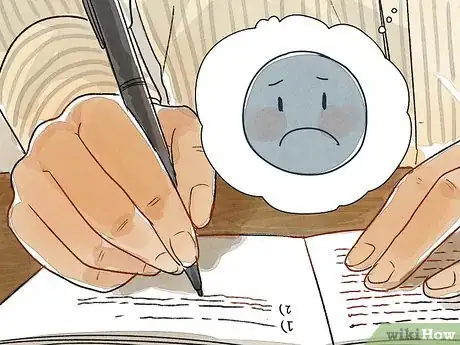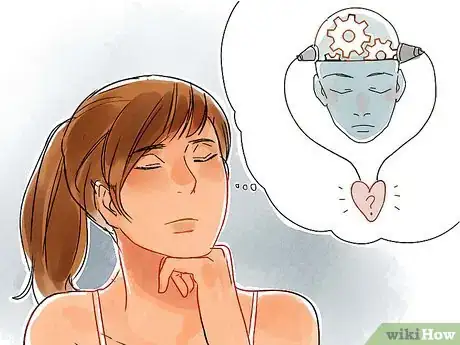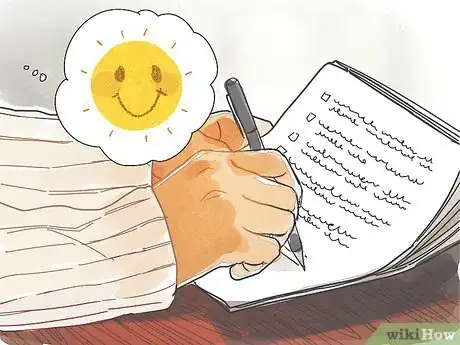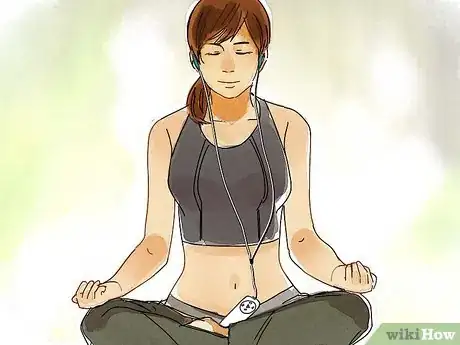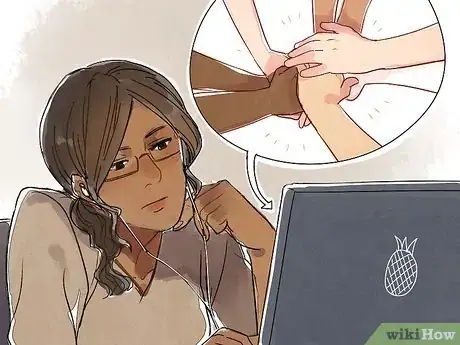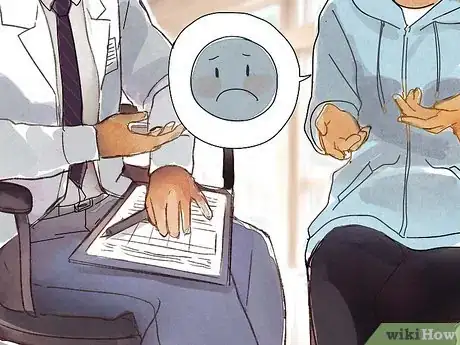This article was co-authored by Nicole Moshfegh, PsyD. Dr. Nicole Moshfegh is a Licensed Clinical Psychologist and Author based in Los Angeles, California. Dr. Moshfegh specializes in multicultural competence and treating patients with mood and anxiety disorders and insomnia. She holds a BA in Psychology and Social Behavior from The University of California, Irvine (UCI), and an MA and Doctor of Psychology (PsyD) from Pepperdine University. Dr. Moshfegh completed her predoctoral internship and postdoctoral fellowship at The University of California, Los Angeles (UCLA). Additionally, she is a member of the American Psychological Association, National Register of Health Service Psychologists, Los Angeles County Psychological Association, and Collaborative Family Healthcare Association. Dr. Moshfegh is also the best-selling author of "The Book of Sleep: 75 Strategies to Relieve Insomnia".
There are 16 references cited in this article, which can be found at the bottom of the page.
This article has been viewed 37,643 times.
The feeling of unhappiness is common and unwelcome by many. It can be very difficult to deal with, and may cause other feelings to emerge, such as worthlessness, anxiety, or weakness. Unhappiness can result from a number of different circumstances in your life, and prolonged feelings of unhappiness can lead to depression. Dealing with your unhappiness is important to prevent depression from occurring.
Steps
Evaluating Your Feelings
-
1Admit to yourself that you are unhappy. To begin any kind of healing, you first must admit there is a problem and identify your feelings.[1] [2] You might try to hide behind different things such as your work or outward happiness to shroud your true unhappiness. You must break down these barriers and face your feeling head-on.
- Admitting that you have a problem is the first step in the 12-step Alcoholics Anonymous program. While you may not have a drinking problem, this program seeks to help and heal you of issues, and can therefore be broadly applied in life. Admitting you are unhappy will jumpstart your healing process.
-
2Write down the events and interactions leading up to times when you are feeling unhappy. Start a diary detailing events, conversations, interactions, or times of day that lead to times when you feel most unhappy.[3] (You can even do this in the "notes" section of your phone.) By doing this you can begin to see patterns of when unhappy feelings occur. Figuring out “triggers” of your unhappiness will help you avoid situations that lead to unhappy feelings.
- For example, if you are in the breakroom at work speaking with a coworker, and leave the room feeling unhappier than when you entered, take out your journal and write down who you were with, what you talked about, who else was there, etc. Doing this for every “unhappy” situation will start to illuminate patterns of triggers of your unhappiness.
- Unhappiness is often situational and will dissipate relatively quickly once removed from the scenario. Yet, it can reappear when you are faced with a similar problem. Writing down specific times that make you unhappy will help you avoid such situations in the future. [4]
Advertisement -
3Ask yourself the specific reasons for something making you unhappy. In each situation that you are presented with that makes you feel unhappy, ask yourself what is, specifically, causing your unhappiness.[5] Write them down. For example, if you are talking with someone who makes you sad, ask yourself, “why does this person make me unhappy?” Or if you are out with friends but you are not feeling upbeat, ask “what about this situation makes me unhappy?” Perhaps it's because that person is very negative or going out with friends reminds you of a dark time in you past. Some other questions you should ask yourself and explore:
- When did I first notice that I'm unhappy?
- How long have I been unhappy?
- Do I feel unhappy at certain times of the day, or is it all day?
- Is there a big event that caused my unhappiness, or is it just little things?
-
4Ask your friends and family if they have noticed increased unhappiness. If you are at a loss for why you might be unhappy, try reaching out to those who love you the most. Ask if they have noticed any changes in your personality. Sometimes it takes an outside perspective to understand your own feelings.
- Trusted loved ones might be able to point out an event in your life that you had forgotten about causing your unhappiness.
-
5Process your feelings. Look through your notes and start identifying patterns of situations, people, experiences, and other things that triggered your feelings of unhappiness. But don't just stop there. If you find you are always unhappy after spending time with your sister, ask yourself why? Is it because she is rude or abusive? Or is it something less obvious, like maybe she reminds you of your father who passed away, and it is still painful for you to think of him?
- Once you start identifying the root of what is making you feel unhappy, you can figure out your next steps. If your job is making you unhappy, then you can start working on your resume and take steps to find something new. If it's a particular person, you might need to cut ties with them. If your unhappiness stems from reminders of a past trauma, then you can seek professional counseling to work through it.
Changing Your Behavior and Thinking
-
1Make a daily list of reasons to be happy. Each morning, reflect on the things in your life that make you feel happy. Try to think about good things in your life that you might not be appreciating. For example, a relationship with a friend, your freedom of speech and religion, and even small things like chocolate! Once you recognize and concretely see all the things in your life that bring you happiness, there is no choice but to feel that inside yourself!
-
2Remain positive. Some things in your day may not have been perfect, and may have made you feel unhappy. That is okay! Think about how you will handle it next time or try to spin the event into a positive one. For example, think about how that was a great learning experience and you can move forward as a stronger person. [6]
- Also try thinking about things that you are looking forward to doing later in the day or week that will make you happy. You might be excited to watch a movie tonight or make a special dinner. Focus on the good things!
-
3Focus on something that interests you. Find a book, TV show, random topic, etc. that really interests you. Switching your focus to something positive can decrease stress. Stress can contribute to unhappy feelings.[7] Try focusing on something that has interested you in the past, or something entirely new.
- If you are unhappy, directing your focus toward something enjoyable, will likely lead to a reduction in your unhappy feelings. Yet, if you still find no solace in such distractions, you might be on the path to depression. [8]
-
4Concentrate on one beautiful object for five minutes. Mindfulness exercises such as this, can help direct attention away from negative things, such as overthinking about your unhappiness, and towards focusing on the present. Focusing on a single object and thinking about all the beautiful things about that object can reduce stress and anxiety, and improve your mood. [9]
- Engage in a mindfulness exercise daily to maximize their effectiveness.
-
5Meditate. When you are feeling especially unhappy, try taking 20 minutes to meditate. Go to a quiet room, sit on the floor, close your eyes and focus on taking slow, deep breaths. While you are meditating, try to empty your mind of all negative thoughts and concentrate on positive things in your life.
-
6Visualize your life as a truly happy person. Create mental images of yourself at a bar with friends or succeeding in your job so you can see where your life could go. By seeing where your life could be by pushing out unhappiness, you will be more motivated to seek happiness. [12]
- Visualization may give you a “path” to happiness. If you know where you want to end, you can get a plan to reach that point.
Making Your Body Happy
-
1Get out of the house. Staying alone in your house and following a daily routine can lead to the path of isolation and unhappy thoughts. Leave your home and break free of your routine. Fresh air will help clear your mind and sunshine will open the doors to happy thoughts. [13]
- Getting out of the house will force you to interact with other people, and draw out your happiness!
-
2Exercise. Exercise has many physical and emotional benefits. While exercising, your body releases endorphins, the “feel good” hormone, causing you to feel more energized and much happier. Exercise has also been shown to reduce stress and reduce the intensity of depression. [14]
- The short-term and long-term benefits of exercising are most effective when you exercise three to four times per week. [15]
- Exercise will also help boost your self esteem by making you look and feel good. A healthy self-esteem will help ward off unhappy thoughts.
-
3Get enough sleep. Sleep affects the function of your brain and can have huge impacts on your mood. A good night's rest helps your brain rejuvenate so you can be more focused, less fatigued, and be in a better mood. [16]
- Adults typically need between seven and nine hours of sleep each night. Teenagers need eight to ten hours of sleep.[17]
-
4Smile. Smiling has actual physiological benefits to increase our happiness. Smiling initializes our brain to produce endorphins which, in turn, stimulates the “reward center” of our brains. Regardless of whether your smile is real, just using your “smiling” muscles makes you happy. [18]
Finding Support
-
1Gather a trusted group of family and friends. A core group of friends and family that you can count on will prove priceless when seeking happiness. Your family and friends can offer you a distraction, and know just the way to make you smile and laugh.[19]
- Being around your loved ones will also help keep you in check. These are the people who will notice your unhappiness and help you work through it.
-
2Do not turn down any social invitations. If a friend from work invites you to a party, accept on the spot. Try to make as many connections and friends as possible. Putting yourself in unfamiliar situations might be scary, but can be immensely helpful in building friendships and support.
- By accepting any and all invitations to events, you force yourself to get out of the house and socialize with others. This will help stave off the desire to isolate, which can lead to greater unhappiness.
-
3Turn to online blogs and support groups. The internet is a wonderful place to anonymously seek help. You can visit blogs and support groups to realize that you are not alone.
-
4Seek professional help. If your unhappiness continues or worsens towards depression, consider seeking professional medical care. Treatment can provide medical and social benefits that will bring you closer to feeling happy[20] [21]
- Try visiting a psychologist to talk through your issues. They are trained to help decipher the root of your unhappiness and help you through your negative emotions.
- Turn to national mental health organizations (such as National Alliance on Mental Illness) to find referrals for a good therapist in your area, online support groups, and other possible treatment options.
- If money is an issue, try visiting a local religious organization, senior center, or community mental health center which offer therapy at various prices. [22]
Expert Q&A
-
QuestionHow long should I journal for?
 Nicole Moshfegh, PsyDDr. Nicole Moshfegh is a Licensed Clinical Psychologist and Author based in Los Angeles, California. Dr. Moshfegh specializes in multicultural competence and treating patients with mood and anxiety disorders and insomnia. She holds a BA in Psychology and Social Behavior from The University of California, Irvine (UCI), and an MA and Doctor of Psychology (PsyD) from Pepperdine University. Dr. Moshfegh completed her predoctoral internship and postdoctoral fellowship at The University of California, Los Angeles (UCLA). Additionally, she is a member of the American Psychological Association, National Register of Health Service Psychologists, Los Angeles County Psychological Association, and Collaborative Family Healthcare Association. Dr. Moshfegh is also the best-selling author of "The Book of Sleep: 75 Strategies to Relieve Insomnia".
Nicole Moshfegh, PsyDDr. Nicole Moshfegh is a Licensed Clinical Psychologist and Author based in Los Angeles, California. Dr. Moshfegh specializes in multicultural competence and treating patients with mood and anxiety disorders and insomnia. She holds a BA in Psychology and Social Behavior from The University of California, Irvine (UCI), and an MA and Doctor of Psychology (PsyD) from Pepperdine University. Dr. Moshfegh completed her predoctoral internship and postdoctoral fellowship at The University of California, Los Angeles (UCLA). Additionally, she is a member of the American Psychological Association, National Register of Health Service Psychologists, Los Angeles County Psychological Association, and Collaborative Family Healthcare Association. Dr. Moshfegh is also the best-selling author of "The Book of Sleep: 75 Strategies to Relieve Insomnia".
Licensed Clinical Psychologist Start out by journaling for around 15-20 minutes each day. Try to write at the same time each day so you can turn your journaling into a consistent habit.
Start out by journaling for around 15-20 minutes each day. Try to write at the same time each day so you can turn your journaling into a consistent habit.
Warnings
- Unhappiness is not a chronic disease like depression. Typically, unhappiness will dissipate relatively quickly and will not require professional help. If your unhappiness feels chronic, and you find no joy in your life even when you are doing things you love, you might be heading towards depression, so seek professional help immediately.⧼thumbs_response⧽
References
- ↑ http://www.caleblack.com/psy5493_files/04%20-%20IDing%20Connecting%20Thoughts%20Feelings.pdf
- ↑ Nicole Moshfegh, PsyD. Licensed Clinical Psychologist. Expert Interview. 5 August 2021.
- ↑ Nicole Moshfegh, PsyD. Licensed Clinical Psychologist. Expert Interview. 5 August 2021.
- ↑ http://depression.com.au/the-main-points/is-it-just-unhappiness/
- ↑ Nicole Moshfegh, PsyD. Licensed Clinical Psychologist. Expert Interview. 5 August 2021.
- ↑ http://www.ncbi.nlm.nih.gov/pmc/articles/PMC3156028/
- ↑ http://www.medscape.com/viewarticle/444154_3
- ↑ http://depression.com.au/the-main-points/is-it-just-unhappiness/
- ↑ http://www.mayoclinic.org/healthy-lifestyle/consumer-health/in-depth/mindfulness-exercises/art-20046356?pg=1
- ↑ http://www.huffingtonpost.com/2014/09/19/meditation-benefits_n_5842870.html
- ↑ Nicole Moshfegh, PsyD. Licensed Clinical Psychologist. Expert Interview. 5 August 2021.
- ↑ http://www.successconsciousness.com/index_000008.htm
- ↑ http://www.webmd.com/depression/features/depression-traps-and-pitfalls
- ↑ https://edition.cnn.com/2016/01/13/health/endorphins-exercise-cause-happiness/index.html
- ↑ http://www.ncbi.nlm.nih.gov/pubmed/10642456
- ↑ https://www.bollandbranch.com/sleep-and-happiness
- ↑ https://sleepfoundation.org/how-sleep-works/how-much-sleep-do-we-really-need
- ↑ http://www.britishcouncil.org/voices-magazine/famelab-whats-science-behind-smile
- ↑ Nicole Moshfegh, PsyD. Licensed Clinical Psychologist. Expert Interview. 5 August 2021.
- ↑ http://www.webmd.com/depression/treating-depression-medication
- ↑ Nicole Moshfegh, PsyD. Licensed Clinical Psychologist. Expert Interview. 5 August 2021.
- ↑ http://www.helpguide.org/articles/depression/depression-treatment.htm


